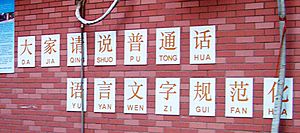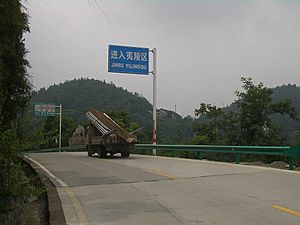Pinyin facts for kids


Pinyin is a special way to write Mandarin sounds using regular Roman letters. It helps people learn how to pronounce Chinese words. The word "Pinyin" itself means "spelling" in Mandarin.
The most common type of Pinyin is called Hanyu Pinyin. It has been used in People's Republic of China since the 1950s. Other countries, like the United States, used different spelling systems before. But now, Hanyu Pinyin is the main way to write Chinese sounds all over the world. It is the official standard for China and the United Nations.
Pinyin uses Roman letters in a unique way for certain Chinese sounds. For example, the letter c in Pinyin sounds like "ts" in the English word "cats". It does not sound like "k" or "s" on its own. Pinyin also uses special marks called diacritics to show the four Chinese tones. These tones are very important for speaking Mandarin clearly.
Contents
How Pinyin Helps You Learn Chinese
Pinyin makes learning Chinese easier for people who speak languages that use the Roman alphabet. It helps you read and say Chinese words even if you don't know the Chinese characters yet.
Pinyin Sounds: Consonants
Pinyin uses many letters you already know for its consonant sounds. Here are some of them:
- b
- p
- m
- f
- w
- d
- t
- n
- l
- g
- k
- h
- j
- q
- x
- y
- z
- c
- s
Pinyin Sounds: Vowels
Pinyin also uses common letters for its vowel sounds. These can be combined to make more complex sounds.
- a
- e
- i
- o
- u
- ü (This is like the "u" in French "tu" or German "über")
Pinyin Sounds: Combinations
Many Pinyin sounds are made by combining vowels and consonants. Here are some basic vowel combinations:
- ai (like "eye")
- ei (like "ay" in "say")
- ao (like "ow" in "cow")
- ou (like "oh" in "go")
- an
- en
- ang
- eng
- ong
Understanding Chinese Tones
Chinese is a tone language. This means that the way you say a word (its tone) can change its meaning. Pinyin uses five special marks to show these tones:
- ā (first tone): high and flat
- á (second tone): rising
- ǎ (third tone): dipping and rising
- à (fourth tone): falling
- a (fifth tone or neutral tone): short and light, no special mark
For example, the sound "ma" can mean different things depending on the tone:
- mā (mother)
- má (hemp)
- mǎ (horse)
- mà (scold)
How Pinyin is Written
When you write sentences in Pinyin, words are usually separated by spaces, just like in English. For example, "I am a foreigner" is written as "Wo shi waiguoren" in Pinyin.
Sometimes, a special mark called a geyin fuhao (syllable-dividing mark) is used. This mark looks like an apostrophe ('). It helps separate syllables that might otherwise be read as one. For example, "pi'ao" shows two separate syllables: "pi" and "ao".
Images for kids
See also
 In Spanish: Pinyin para niños
In Spanish: Pinyin para niños
 | Misty Copeland |
 | Raven Wilkinson |
 | Debra Austin |
 | Aesha Ash |



